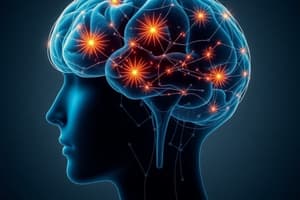Podcast
Questions and Answers
A researcher is interested in understanding how cultural norms impact rates of depression in different countries. Which approach to psychology is MOST aligned with this research?
A researcher is interested in understanding how cultural norms impact rates of depression in different countries. Which approach to psychology is MOST aligned with this research?
- Behavioral approach
- Evolutionary approach
- Cognitive approach
- Sociocultural approach (correct)
A therapist believes that their client's anxiety stems from unresolved childhood conflicts. Which psychological approach is the therapist utilizing?
A therapist believes that their client's anxiety stems from unresolved childhood conflicts. Which psychological approach is the therapist utilizing?
- Humanistic
- Psychodynamic (correct)
- Behavioral
- Cognitive
A researcher is conducting a study to determine if watching violent television shows causes aggression in children. Which research method would be MOST appropriate for establishing a cause-and-effect relationship?
A researcher is conducting a study to determine if watching violent television shows causes aggression in children. Which research method would be MOST appropriate for establishing a cause-and-effect relationship?
- Experimental research (correct)
- Correlational research
- Naturalistic observation
- Case study
A pharmaceutical company is testing a new drug designed to improve memory. They divide participants into two groups: one receives the drug, and the other receives a placebo. Participants then complete a memory test, and their scores are compared. Which type of research is being conducted?
A pharmaceutical company is testing a new drug designed to improve memory. They divide participants into two groups: one receives the drug, and the other receives a placebo. Participants then complete a memory test, and their scores are compared. Which type of research is being conducted?
Which psychological perspective is MOST likely to explain behavior by examining the physiological processes, such as brain functions and hormonal influences.
Which psychological perspective is MOST likely to explain behavior by examining the physiological processes, such as brain functions and hormonal influences.
Which of the following scenarios BEST exemplifies operant conditioning?
Which of the following scenarios BEST exemplifies operant conditioning?
Which of the following is the BEST example of how cognition influences behavior?
Which of the following is the BEST example of how cognition influences behavior?
A researcher finds a strong positive correlation between hours spent studying and exam scores. What can they conclude from this research?
A researcher finds a strong positive correlation between hours spent studying and exam scores. What can they conclude from this research?
A researcher is conducting an experiment where participants are asked to identify the quietest sound they can detect. What is the researcher trying to determine?
A researcher is conducting an experiment where participants are asked to identify the quietest sound they can detect. What is the researcher trying to determine?
A child learns to avoid touching a hot stove after experiencing pain. Which type of learning best explains this?
A child learns to avoid touching a hot stove after experiencing pain. Which type of learning best explains this?
A student is having trouble remembering the different parts of the brain for an upcoming exam. Which memory process is the student struggling with?
A student is having trouble remembering the different parts of the brain for an upcoming exam. Which memory process is the student struggling with?
A person who tends to explain their successes as a result of their own abilities and their failures as a result of external circumstances is demonstrating what?
A person who tends to explain their successes as a result of their own abilities and their failures as a result of external circumstances is demonstrating what?
What is the primary aim of cognitive therapy in treating psychological disorders?
What is the primary aim of cognitive therapy in treating psychological disorders?
Which of the following statements best describes the role of B.F. Skinner's work in the field of psychology?
Which of the following statements best describes the role of B.F. Skinner's work in the field of psychology?
What is the primary difference between sensation and perception?
What is the primary difference between sensation and perception?
Which scenario exemplifies negative reinforcement?
Which scenario exemplifies negative reinforcement?
What is the key distinction between explicit and implicit memory?
What is the key distinction between explicit and implicit memory?
In the context of social psychology, what does cognitive dissonance refer to?
In the context of social psychology, what does cognitive dissonance refer to?
Which of the following is a key characteristic of personality disorders?
Which of the following is a key characteristic of personality disorders?
A therapist is helping a client overcome a fear of public speaking by gradually exposing them to increasingly challenging speaking situations. Which therapeutic technique is being used?
A therapist is helping a client overcome a fear of public speaking by gradually exposing them to increasingly challenging speaking situations. Which therapeutic technique is being used?
Which of the following scenarios best illustrates the concept of social loafing?
Which of the following scenarios best illustrates the concept of social loafing?
A person is experiencing unwanted, repetitive thoughts that cause significant anxiety, leading them to perform certain rituals to alleviate the distress. Which disorder is most likely present?
A person is experiencing unwanted, repetitive thoughts that cause significant anxiety, leading them to perform certain rituals to alleviate the distress. Which disorder is most likely present?
How do positive punishment and negative punishment differ in operant conditioning?
How do positive punishment and negative punishment differ in operant conditioning?
Flashcards
Psychology
Psychology
The scientific study of the mind and behavior.
Biological Approach
Biological Approach
Focuses on how the brain, nervous system, and genetics influence behavior.
Behavioral Approach
Behavioral Approach
Emphasizes the role of learning and environmental factors in shaping behavior.
Cognitive Approach
Cognitive Approach
Signup and view all the flashcards
Descriptive Research
Descriptive Research
Signup and view all the flashcards
Correlational Research
Correlational Research
Signup and view all the flashcards
Experimental Research
Experimental Research
Signup and view all the flashcards
Consciousness
Consciousness
Signup and view all the flashcards
Psychological Disorder
Psychological Disorder
Signup and view all the flashcards
Absolute Threshold
Absolute Threshold
Signup and view all the flashcards
Difference Threshold
Difference Threshold
Signup and view all the flashcards
Sensory Adaptation
Sensory Adaptation
Signup and view all the flashcards
Classical Conditioning
Classical Conditioning
Signup and view all the flashcards
Operant Conditioning
Operant Conditioning
Signup and view all the flashcards
Reinforcement
Reinforcement
Signup and view all the flashcards
Punishment
Punishment
Signup and view all the flashcards
Observational Learning
Observational Learning
Signup and view all the flashcards
Encoding
Encoding
Signup and view all the flashcards
Storage
Storage
Signup and view all the flashcards
Retrieval
Retrieval
Signup and view all the flashcards
Conformity
Conformity
Signup and view all the flashcards
Prejudice
Prejudice
Signup and view all the flashcards
Psychotherapy
Psychotherapy
Signup and view all the flashcards
Study Notes
- Psychology is the scientific study of the mind and behavior.
- It encompasses a wide range of subfields, including clinical, cognitive, developmental, social, and organizational psychology.
Approaches to Psychology
- Biological approach: Focuses how the brain, nervous system, and genetics influence behavior.
- Behavioral approach: Emphasizes the role of learning and environmental factors in shaping behavior.
- Cognitive approach: Studies mental processes such as memory, problem-solving, and language
- Psychodynamic approach: Focuses unconscious drives and early childhood experiences and how they shape behavior.
- Humanistic approach: Emphasizes personal growth, self-actualization, and the individual's subjective experience.
- Evolutionary approach: Examines how behavior and mental processes have evolved over time through natural selection.
- Sociocultural approach: Investigates the influence of social and cultural factors on behavior and mental processes.
Research Methods in Psychology
- Descriptive research: Describes phenomena without manipulating variables (e.g., naturalistic observation, surveys, case studies).
- Correlational research: Examines the relationships between variables without determining cause and effect.
- Experimental research: Manipulates one or more variables to determine their effect on other variables, allowing for cause-and-effect conclusions.
Key Concepts in Psychology
- Sensation and perception: Study of how sensory information is detected, processed, and interpreted.
- Consciousness: Awareness of oneself and the environment; includes topics such as sleep, dreams, and altered states.
- Learning: Relatively permanent change in behavior due to experience (e.g., classical conditioning, operant conditioning, observational learning).
- Memory: Processes involved in encoding, storing, and retrieving information.
- Cognition: Mental processes involved in thinking, knowing, remembering, and communicating.
- Intelligence: Ability to learn from experience, solve problems, and adapt to new situations.
- Motivation: Factors that energize, direct, and sustain behavior.
- Emotion: Subjective experience involving physiological arousal, expressive behavior, and cognitive appraisal.
- Developmental psychology: Study of physical, cognitive, and social changes across the lifespan.
- Personality: Individual's characteristic pattern of thinking, feeling, and behaving.
- Social psychology: Study of how individuals think about, influence, and relate to one another.
- Psychological disorders: Patterns of thoughts, feelings, or behaviors that are deviant, distressful, and dysfunctional.
Major Figures in Psychology
- Wilhelm Wundt: Established first psychology laboratory in 1879 and is considered the "father of psychology."
- William James: Key figure in functionalism, emphasizing the purpose of consciousness and behavior.
- Sigmund Freud: Developed psychoanalysis, emphasizing the role of unconscious processes in shaping behavior.
- Ivan Pavlov: Discovered classical conditioning through his experiments with dogs.
- B.F. Skinner: Pioneered operant conditioning, studying how behavior is shaped by reinforcement and punishment.
- Albert Bandura: Known for his social learning theory, emphasizing the role of observation and imitation in learning.
- Jean Piaget: Developed a theory of cognitive development, outlining stages of intellectual growth in children.
Sensation and Perception
- Sensation: The process by which sensory receptors and the nervous system receive and represent stimulus energies from our environment.
- Perception: The process of organizing and interpreting sensory information, enabling us to recognize meaningful objects and events.
- Absolute threshold: The minimum stimulation needed to detect a particular stimulus 50% of the time.
- Difference threshold (just noticeable difference): The minimum difference between two stimuli required for detection 50% of the time.
- Sensory adaptation: Diminished sensitivity as a consequence of constant stimulation.
- Vision: Light enters the eye and is processed by receptors in the retina (rods and cones).
- Hearing: Sound waves enter the ear and are converted into neural signals processed by the auditory system.
- Other senses: Touch, taste, smell, and the vestibular sense (sense of balance).
Learning
- Classical conditioning: Learning by association, where a neutral stimulus becomes associated with a meaningful stimulus (Pavlov's dogs).
- Operant conditioning: Learning through consequences, where behavior is strengthened by reinforcers and weakened by punishers (Skinner's boxes).
- Reinforcement: Increases the likelihood of a behavior (positive reinforcement adds something desirable; negative reinforcement removes something undesirable).
- Punishment: Decreases the likelihood of a behavior (positive punishment adds something undesirable; negative punishment removes something desirable).
- Observational learning: Learning by watching others and imitating their behavior (Bandura's Bobo doll experiment).
Memory
- Encoding: Processing information into the memory system.
- Storage: Retaining encoded information over time.
- Retrieval: Getting information out of memory storage.
- Sensory memory: Immediate, very brief recording of sensory information.
- Short-term memory: Activated memory that holds a few items briefly before the information is stored or forgotten.
- Long-term memory: Relatively permanent and limitless storehouse of the memory system.
- Explicit (declarative) memory: Memory of facts and experiences that one can consciously know and declare.
- Implicit (nondeclarative) memory: Memory of skills and procedures that are automatically retrieved.
Social Psychology
- Attribution: Process of explaining one's own behavior and the behavior of others.
- Attitudes: Feelings, often influenced by our beliefs, that predispose us to respond in a particular way to objects, people, and events.
- Cognitive dissonance: Discomfort experienced when attitudes and behavior are inconsistent.
- Conformity: Adjusting one's behavior or thinking to coincide with a group standard.
- Obedience: Compliance with an authority figure's demands.
- Group behavior: Social facilitation (improved performance in the presence of others), social loafing (reduced effort in a group), deindividuation (loss of self-awareness and self-restraint in group situations).
- Prejudice: Unjustifiable negative attitude toward a group and its members.
- Aggression: Physical or verbal behavior intended to hurt someone.
- Altruism: Unselfish regard for the welfare of others.
Psychological Disorders
- Anxiety disorders: Characterized by excessive worry, fear, and avoidance (e.g., generalized anxiety disorder, panic disorder, phobias).
- Obsessive-compulsive disorder (OCD): Characterized by unwanted, repetitive thoughts (obsessions) and/or actions (compulsions).
- Depressive disorders: Characterized by persistent sadness, loss of interest, and other symptoms (e.g., major depressive disorder).
- Bipolar disorder: Characterized by alternating periods of mania (high energy and elevated mood) and depression.
- Schizophrenia: Characterized by hallucinations, delusions, disorganized thinking, and other psychotic symptoms.
- Personality disorders: Characterized by inflexible and enduring behavior patterns that impair social functioning (e.g., antisocial personality disorder, borderline personality disorder).
- Neurodevelopmental disorders: Disorders that manifest early in development and are characterized by developmental deficits (e.g., autism spectrum disorder, ADHD).
Therapy
- Psychotherapy: Treatment involving psychological techniques; consists of interactions between a trained therapist and someone seeking to overcome psychological difficulties or achieve personal growth.
- Biomedical therapy: Treatment involving medication or other medical procedures to alter the brain's chemistry or physiology.
- Cognitive therapy: Therapy that teaches people new, more adaptive ways of thinking; based on the assumption that thoughts intervene between events and our emotional reactions.
- Behavior therapy: Therapy that applies learning principles to the elimination of unwanted behaviors (e.g., exposure therapy, systematic desensitization).
- Humanistic therapy: Therapy that emphasizes self-awareness, acceptance, and growth (e.g., client-centered therapy).
- Group therapy: Therapy conducted with groups rather than individuals, permitting therapeutic benefits from group interaction.
Studying That Suits You
Use AI to generate personalized quizzes and flashcards to suit your learning preferences.




